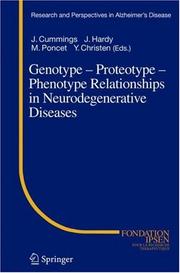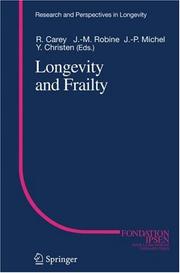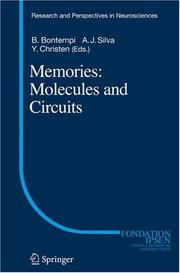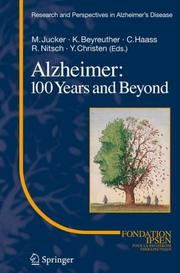| Listing 1 - 6 of 6 |
Sort by
|

ISSN: 09456066 ISBN: 9783540265221 9783540248354 3540248358 3642063950 9786610304820 1280304820 3540265228 Year: 2005 Publisher: Berlin ; New York : Springer,
Abstract | Keywords | Export | Availability | Bookmark
 Loading...
Loading...Choose an application
- Reference Manager
- EndNote
- RefWorks (Direct export to RefWorks)
Protein misfolding and other abnormalities of protein metabolism are increasingly recognized as central mechanisms in the pathophysiology of neurodegenerative disorders. Amyloid beta protein disturbances in Alzheimer’s disease, tau and ubiquitin protein abnormalities in frontotemporal dementias, proteasome and alpha-synuclein disorders in Parkinson’s disease and dementia with Lewy bodies comprise central elements in these common neurodegenerative diseases. Improved understanding of role of protein dysmetabolism in neurodegeneration promises to improve diagnoses, facilitate the development of biological markers relevant to disease pathophysiology, and provide tractable therapeutic targets. This Fondation IPSEN conference summary provides an update on the latest advances of the role of protein misfolding in the pathophysiology of neurodegenerative diseases.
Neuropathology --- neurologie --- Neurodegenerative Diseases --- Protein Folding --- Nervous system --- Système nerveux --- genetics --- Congresses --- physiopathology --- Degeneration --- Genetic aspects --- Dégénérescence --- Congrès --- Medicine. --- Neurosciences. --- Neurology. --- Biomedicine. --- Organs (Anatomy) --- Neurosciences --- Medicine --- Neuropsychiatry --- Neural sciences --- Neurological sciences --- Neuroscience --- Medical sciences --- Diseases --- Neurology .
Book
ISBN: 1281118338 9786611118334 354073855X 3540738541 3642093108 Year: 2008 Publisher: Berlin : Springer,
Abstract | Keywords | Export | Availability | Bookmark
 Loading...
Loading...Choose an application
- Reference Manager
- EndNote
- RefWorks (Direct export to RefWorks)
will follow .
Cell cycle --- Regulation --- Mitotic cycle --- Nuclear cycle (Cytology) --- Biological rhythms --- Endocrinology. --- Developmental biology. --- Oncology. --- Developmental Biology. --- Cancer Research. --- Tumors --- Development (Biology) --- Biology --- Growth --- Ontogeny --- Internal medicine --- Hormones --- Endocrinology . --- Cancer research. --- Cancer research

ISBN: 1280411805 9786610411801 3540273883 3540251537 3642064299 Year: 2005 Publisher: New York, NY : Springer,
Abstract | Keywords | Export | Availability | Bookmark
 Loading...
Loading...Choose an application
- Reference Manager
- EndNote
- RefWorks (Direct export to RefWorks)
Understanding the relationship between frailty and longevity becomes increasingly important as the world continues to age and life expectancy in most countries continues to increase. The articles contained in this book are the outcome of a colloquium sponsored by Fondation IPSEN in which interdisciplinary perspectives were brought to bear on conceptual, empirical and clinical aspects of this relationship. The result is a unique, innovative and timely blend of papers on topics ranging from frailty concepts in animal models and early Homo sapiens, to documentation of progress in morbidity compression, on the relationships between frailty and impairments and inflammation, and perspectives on long-term health care needs in an aging world.
Longevity --- Aging --- Frail elderly --- Elderly, Frail --- Frail older people --- Older people --- Medicine. --- Biomedicine general. --- Clinical sciences --- Medical profession --- Human biology --- Life sciences --- Medical sciences --- Pathology --- Physicians --- Health Workforce --- Biomedicine, general.

ISBN: 1280853662 9786610853663 354045702X 3540456988 3642079571 Year: 2007 Publisher: Berlin ; New York : Springer,
Abstract | Keywords | Export | Availability | Bookmark
 Loading...
Loading...Choose an application
- Reference Manager
- EndNote
- RefWorks (Direct export to RefWorks)
Memories: Molecules and Circuits The questions of how, where and when memory traces are formed in the brain remain central issues in Cognitive Neuroscience. How do neuronal systems encode, consolidate and retrieve memory? How are memories embedded into complex neuronal networks? How do molecular mechanisms modulate the neuronal plasticity and functioning of these networks during memory processing? What are the fundamental units of computation in the brain? Thanks to the development of novel approaches, including transgenic techniques, functional brain imaging, multiple cell recording, functional genomics and proteomics, the last decade has been witness to dramatic advances in the neurobiology, neuroanatomy, neurophysiology and neuropathology of learning and memory processes. This volume surveys the recent advances and provides an integrative view of molecular, cellular, and systems level mechanisms underlying cognitive processes in both animals and humans. Current state of the art and future avenues are discussed by distinguished scientists who provide not only an overview of the underlying neurobiology of cognitive processes from a basic science standpoint, but who also focus on clinical and therapeutic aspects surrounding impairments associated with disorders that affect cognition.
Memory --- Cognitive neuroscience --- Physiological aspects --- Neurosciences. --- Neural sciences --- Neurological sciences --- Neuroscience --- Medical sciences --- Nervous system
Book
ISBN: 3540582053 0387582053 3642791255 3642791239 Year: 1994 Publisher: Berlin ; New York ; Tokyo Springer-Verlag
Abstract | Keywords | Export | Availability | Bookmark
 Loading...
Loading...Choose an application
- Reference Manager
- EndNote
- RefWorks (Direct export to RefWorks)


ISBN: 9783540376514 9783540376521 3540376518 Year: 2006 Publisher: Berlin ; New York : ©2006 Springer,
Abstract | Keywords | Export | Availability | Bookmark
 Loading...
Loading...Choose an application
- Reference Manager
- EndNote
- RefWorks (Direct export to RefWorks)
Few medical or scientific addresses have so unmistakeably made history as the presentation delivered by Alois Alzheimer on November 4th, 1906 in Tübingen. The celebratory event, "Alzheimer 100 Years and Beyond" organized on the initiative of the Alzheimer community in Germany and worldwide, in collaboration with the Fondation Ipsen, at the very site of the original lecture, namely the Institute of Psychiatry at the University of Tübingen in Germany from November 2nd to 5th, 2006, was the highlight of the Alzheimer Year. Over the last century of Alzheimer research (1906-2006), remarkable progress has been achieved. Most of the authors of the major discoveries and the people involved in research in this field will present, during the meeting and in this volume, the pioneering research explaining the conditions under which they were conducted. The goal of this book is to honor the work accomplished, to summarize the most important knowledge and to provide material for the history of science.
Alzheimer Disease --- Alzheimer's disease --- Maladie d'Alzheimer --- Congresses. --- history --- Congresses --- History --- Congrès --- Histoire --- Alzheimer, Alois --- EPUB-LIV-FT SPRINGER-B LIVBIOMO LIVMEDEC --- Alzheimer, Maladie d' --- Alzheimer, Alois. --- Alzheimer Disease. --- history.
| Listing 1 - 6 of 6 |
Sort by
|

 Search
Search Feedback
Feedback About UniCat
About UniCat  Help
Help News
News